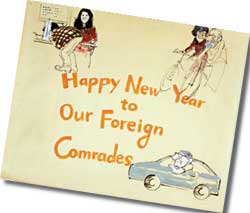
China Daily marks its first Spring Festival with its resident "foreign experts." - Clockwise from top: Manli Ho and John B. Wood (looking into the canteen counter) at lunch; Dorothy and James Uhl; and the late veteran expert Julian Schumann with his ubiquitous toothpick and Honda Civic. This cartoon poster has been kept by Ho and Wood for nearly 25 years.
When China opened its doors in 1978, we began looking for ways to see Manli's ancestral homeland.
At that time, China was bringing in many "foreign experts" to help facilitate its contacts with the outside world. Most taught English, for which we, as journalists, did not feel particularly suited.
When our colleague Charlie Whipple newly retired as editorial page editor of the Boston Globe went to China in 1979 to work for Beijing Review, we immediately began to see other possibilities.
It turned out that Charlie was actually brought over to help to set up a new English language newspaper which would be geared toward the growing number of foreign businessmen and tourists coming to a newly opened China.
We were both newspaper reporters of the Pentagon Papers and Watergate era, steeped in a certain journalistic ethic, so for us to go to China to work on a government-run newspaper was looked upon with a certain amount of skepticism by our peers.
It is difficult now to imagine what a professional, cultural, and linguistic chasm we faced.
We applied and waited. Our understanding was that the editorial content would be determined by the Chinese, that our task as "foreign experts" would be to help produce a paper whose style would look professional and familiar to foreign newspaper readers, and to "polish" the language into readable English.
A year and a half passed. Finally, in mid-May 1981, we received a letter from the "Foreign Affairs Office" that we were to appear in Beijing on June 1 with no further explanation.
After scrambling to quit our jobs, rent our house and get our affairs in order, we flew to China, only to find that we missed the official launching of China Daily by a day!
A quarter of a century later, it is astonishing to look back and realize what a monumental task it must have been for Feng Xiliang and the founders of China Daily to pull off this ambitious undertaking, to virtually change the template for this Chinese newspaper.
After years of being shut off from the outside world, just finding enough English speakers in China was an enormous challenge. As a result, most of the China Daily staff in those first years were middle-aged or elderly, who learned their English prior to 1949.
The next generation of China Daily staff was being groomed. These were young foreign language institute graduates who were sent abroad to various programmes to learn journalism.
In the meantime, the process of producing the daily paper was cumbersome and labour-intensive. In those first days, most articles were translated from the Chinese press. Until the new generation of staff returned from their studies, there were few reporters who went out on stories.
Articles were written on typewriters and then given to foreign experts to "polish."
Often that meant rewriting the entire piece. Chinese and English are such different languages that word for word translations often sounded nonsensical. It was a frustrating and unending battle against what we termed "Chinglish." The editorial page pieces were especially prone to this ailment.
After polishing, an article would arrive at the copy desk for copy editing, a headline and final inspection by a foreign expert before being turned over to the typesetters, who wore white lab coats and worked on computers in a dust free room.
They knew no English, so the results had to be proofread by readers who would check the typeset version against the marked up hard copy by reading out loud to each other. It was truly miraculous that the paper came out daily.
Then there were the foreign experts. The paper had brought in professional journalists from various English-speaking countries the United States, Britain, and Australia.
The majority of experts were American and British, which created its own peculiar clash of cultures and styles. The British came mostly from the English provincial and tabloid press for three-month stints, courtesy of the Lord Thompson Foundation.
At first, the paper was regarded as a stepchild to the more official Chinese press. The foreign press however, began to refer to it as the "official" China Daily.
It also became clear that the paper was reaching a much wider audience than its target market of foreigners. There was a growing Chinese readership trying to learn English by reading China Daily.
These readers often wrote letters to the editor asking for the meaning of words which were clearly typos.
We stayed for those first two eventful years, which now seem a lifetime ago. When we returned in 1990 to help with the Asian Games coverage, China Daily was well established, with a new building, new state of the art computers and a staff trained in English and journalism.
Since then, we have visited our old friends at the paper from time to time. China Daily has reached maturity, and we are happy to see that the nursing we provided during its infancy is now an anachronism.
Manli Ho and John B. Wood took "early retirement" from journalism and live in Arrowsic Maine. Ho works for the Boston- based executive search firm of Isaacson Miller. She is also writing a book about her late father, the Chinese diplomat Dr. Ho Feng Shan. John B. Wood owns Island Surveys, a land surveying company.
(China Daily 05/31/2006 page4)
